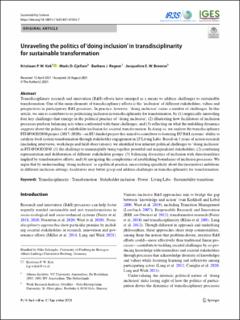| dc.contributor.author | Kok, Kristiaan P. W. | |
| dc.contributor.author | Gjefsen, Mads Dahl | |
| dc.contributor.author | Regeer, Barbara J. | |
| dc.contributor.author | Broerse, Jacqueline | |
| dc.date.accessioned | 2021-11-04T13:30:02Z | |
| dc.date.available | 2021-11-04T13:30:02Z | |
| dc.date.created | 2021-09-24T15:32:58Z | |
| dc.date.issued | 2021-09-13 | |
| dc.identifier.citation | Sustainability Science. 2021, . | en_US |
| dc.identifier.issn | 1862-4065 | |
| dc.identifier.issn | 1862-4057 | |
| dc.identifier.uri | https://hdl.handle.net/11250/2827947 | |
| dc.description.abstract | Transdisciplinary research and innovation (R&I) eforts have emerged as a means to address challenges to sustainable transformation. One of the main elements of transdisciplinary eforts is the ‘inclusion’ of diferent stakeholders, values and perspectives in participatory R&I processes. In practice, however, ‘doing inclusion’ raises a number of challenges. In this article, we aim to contribute to re-politicizing inclusion in transdisciplinarity for transformation, by (1) empirically unraveling four key challenges that emerge in the political practice of ‘doing inclusion’, (2) illustrating how facilitators of inclusion processes perform balancing acts when confronted with these challenges, and (3) refecting on what the unfolding dynamics suggests about the politics of stakeholder inclusion for societal transformation. In doing so, we analyze the transdisciplinary FIT4FOOD2030 project (2017–2020)—an EU-funded project that aimed to contribute to fostering EU R&I systems’ ability to catalyze food system transformation through stakeholder engagement in 25 Living Labs. Based on 3 years of action-research (including interviews, workshops and feld observations), we identifed four inherent political challenges to ‘doing inclusion’ in FIT4FOOD2030: (1) the challenge to meaningfully bring together powerful and marginalized stakeholders; (2) combining representation and deliberation of diferent stakeholder groups; (3) balancing diversities of inclusion with directionalities implied by transformative eforts; and (4) navigating the complexities of establishing boundaries of inclusion processes. We argue that by understanding ‘doing inclusion’ as a political practice, necessitating specificity about the (normative) ambitions in diferent inclusion settings, facilitators may better grasp and address challenges in transdisciplinarity for transformation. | en_US |
| dc.description.sponsorship | This work was supported by the European project FIT4FOOD 2030, which received funding from the European Union’s Horizon 2020 research and innovation programme under grant agreement No 774088. | en_US |
| dc.language.iso | eng | en_US |
| dc.publisher | Springer | en_US |
| dc.relation.ispartofseries | Sustainability Science;16 (2021) | |
| dc.rights | Navngivelse 4.0 Internasjonal | * |
| dc.rights.uri | http://creativecommons.org/licenses/by/4.0/deed.no | * |
| dc.subject | Transdisciplinarity | en_US |
| dc.subject | Transformations | en_US |
| dc.subject | Stakeholder inclusions | en_US |
| dc.subject | Power | en_US |
| dc.subject | Living Labs | en_US |
| dc.subject | Sustainability transitions | en_US |
| dc.title | Unraveling the politics of ‘doing inclusion’ in transdisciplinarity for sustainable transformation | en_US |
| dc.type | Peer reviewed | en_US |
| dc.type | Journal article | en_US |
| dc.description.version | publishedVersion | en_US |
| dc.rights.holder | © The Author(s) 2021 | en_US |
| dc.source.articlenumber | 16 | en_US |
| cristin.ispublished | true | |
| cristin.fulltext | original | |
| cristin.qualitycode | 1 | |
| dc.identifier.doi | https://doi.org/10.1007/s11625-021-01033-7 | |
| dc.identifier.cristin | 1938370 | |
| dc.source.journal | Sustainability Science | en_US |
| dc.source.pagenumber | 1811–1826 | en_US |
| dc.relation.project | EC/H2020/774088 | en_US |

